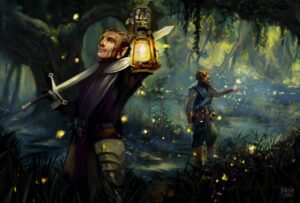In the game of Dungeons & Dragons, a character’s background represents their upbringing and what they used to do with their life before becoming an adventurer. Every character is unique and spent their time differently before setting out to find fame and fortune slaying monsters and saving lives. This can make choosing a background difficult at times. If you are new to the game or would like to know more about how backgrounds function, you can check out my article What Is A Background & How To Use It.
Table of Contents
What is an Outlander?
An outlander lives most of their life out in the wilds away from civilization and survives solely upon the land and animals around them. They’ve witnessed the migration of mighty herds, experienced weather more extreme than any city-dweller could imagine, and enjoyed the blissfulness of being the only intelligent creature for miles. These people can be nomads, explorers, recluses, hunter-gatherers, or marauders. They may not always be familiar with the terrain they find themselves in, but they always know what it’s like to survive in the wild. It’s in their blood.
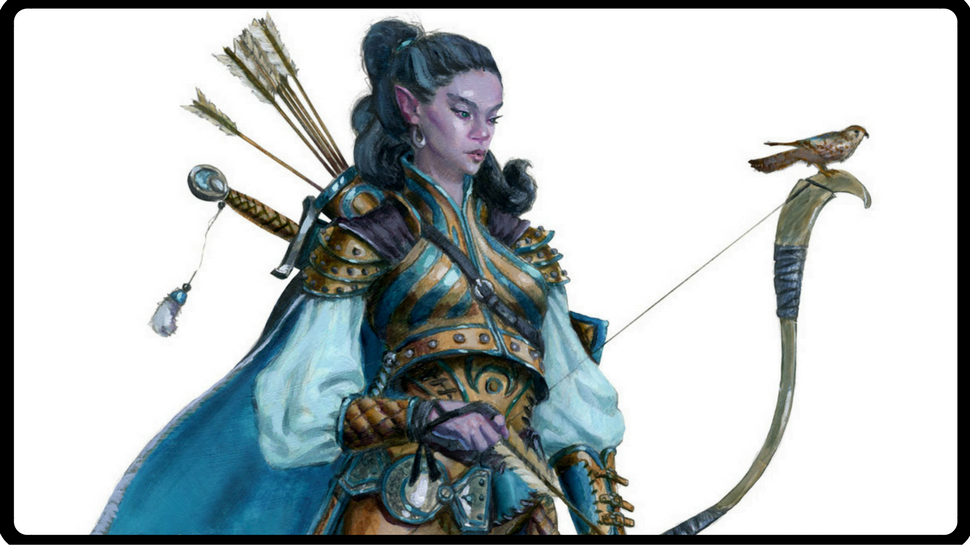
Outlanders in D&D
The Outlander background is perfect for any character that wants to be good at tracking or surviving in the wild. Maybe your character was born into a tribe of hunters and gatherers who taught them to live off the land and alongside the animals, or did they forsake their life among the busy urban streets and trade it for one of peace while figuring out how to live in the wild? Perhaps they were a nomad who become accustomed to traveling in almost any type of terrain or a marauder that learned from the predators around them to hunt and prey on others. One thing is sure, no matter where an outlander finds themselves, the wilds are always with them.
A human druid seeking shelter during a rain storm, an orc ranger making smoke signals to warn his clan of an attack, and a drow scout leading a raiding party through an underground cavern, are prime examples of characters that could have the Outlander background. Outlanders can be found in just about every environment, even large cities, though they may not stick around for long. Maybe they just stopped in for supplies or had some work bring them there. Many different kinds of people try to survive in the wild so this background can work well with any class. In addition to that, the skill proficiencies and the feature granted by this background are useful to pretty much any character so it is no surprise as to why this is such a popular background.
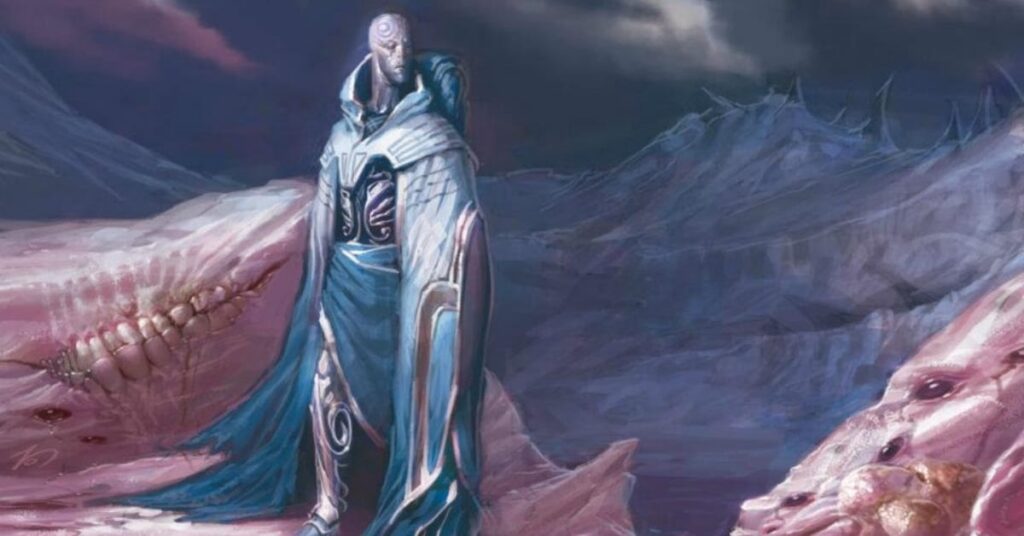
Outlandish Origins
An outlander’s origin of experience in the wild shapes what their relationship with the wild is. If they were born among it then maybe it is all they know making the comfort of modern amenities seem foreign to them. Nomads may forgo many material possessions being used to traveling light so they can keep up with the herds but a recluse may be standoffish and used to only having to care for itself. An outlander’s origins not only shape how it views nature but also people as well.
The Origins table provided for this background allows you to roll for or pick one option from the list to represent your origins as an outlander. This tells what your character spent the majority of their time doing in the wild. The origins provided range from things like trapper, guide, and hunter-gatherer to a bounty hunter, tribal marauder, and outcast. As I mentioned earlier, many kinds of people decide to live in the wild in fantasy settings so you may want something that isn’t on the Origins table in the PHB. Just talk with your DM to work out whatever that is. Just make sure whatever you pick is going to be something you will enjoy playing with.
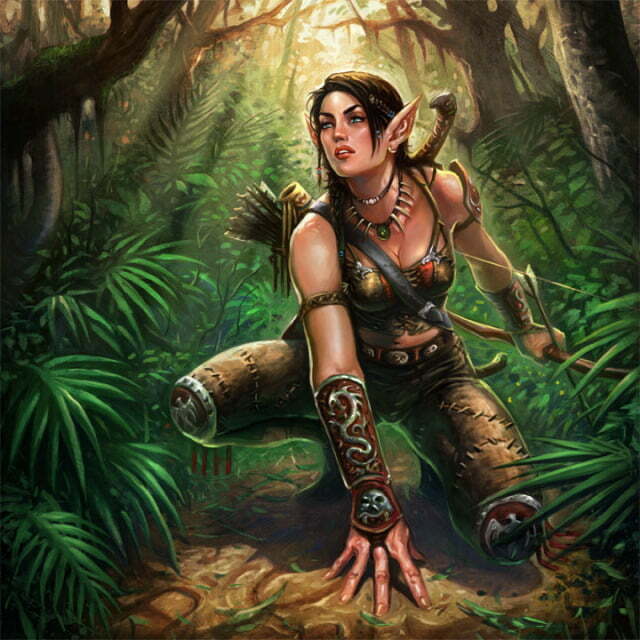
Outlander Feature: Wanderer
With each background comes a feature, and this feature is one of the main reasons this background is selected so frequently. When you choose this background you gain an excellent memory for maps and geography which allows you to recall information about the general layout of terrain, settlements, and other such features around you. This is only the first sentence of the feature and it already makes it invaluable to any character. It doesn’t guarantee that you can’t get lost and it isn’t as helpful while in other dimensions or on other planes that don’t function like the Material Plane, but it is incredibly helpful in keeping tabs on where you and your party are at all times and it makes traversing unknown territory much easier to do without getting lost.
The other half of this feature is also very valuable just in a different sense. In addition to your excellent memory for maps and terrain, you can find food and fresh water for yourself and up to five other people every day as long as the terrain you’re currently in naturally provides things like berries, small game, water, etc. This part of the feature is valuable in the sense that it helps cut down on the mundane acts of having to buy, hunt, or store food. It saves you time and resources. It’s always good to have a few rations on hand, but you don’t need to waste coins on them as often when you have someone with the Outlander background in the party.
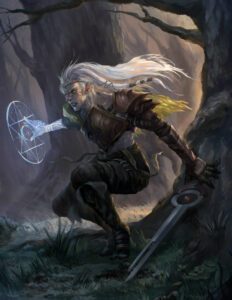
Customizing Your Outlander
A character with the Outlander background gains proficiency in two skills very useful to players, Athletics and Survival. They also gain proficiency with one musical instrument and one language of their choice. The two skill proficiencies gained with this background are necessary for any outlander to survive in the wild. However, different people, and even animals, use different tactics for survival, so if you feel like other skills would fit your character better just bring it up with your dungeon master. The same thing goes for the musical instrument proficiency that you gain. If you feel like your character lived too rough of life to have the luxury of learning music, or that they would have just been too busy with other things, you can always speak to your DM about swapping out your musical instrument for proficiency with a set of artisan’s tools or something else that fits them appropriately.
A list of starting equipment also comes with each background. For the Outlander background, this list features items such as a staff, a hunting trap, a trophy from an animal they killed, a set of traveler’s clothes, and a pouch containing 10 GP. The first two items listed here, the staff and the hunting trap, are pretty useful as they are both usable weapons. The staff acts as a normal quarterstaff and the hunting trap can be used for, well, hunting, but also for trying to subdue enemies, as part of an ambush, or for betting money patrons in a tavern can’t grab their ale out of it before it closes. You can get creative with the animal trophy that you have to add some good flavor to your backstory. Think of an animal you could have reasonably killed, or maybe taken down with a hunting party, and come up with the story of the hunt. You can ask your DM for help in determining what kind of beasts would be in your area and come up with something fun.
Suggested Origins
Every outlander has its origin. Their origin establishes what they did with the bulk of their time living among the wilds and can help determine how they interacted with other people. Here I’m going to match up some of the choices on the Origins table that fill well with each class and I’m also going to sprinkle in some new options that I came up with myself.
Artificer
Farmer, Homesteader, Outcast, Prospector, Trapper
Barbarian
Bounty Hunter, Exile, Forester, Ground Breaker, Guardian, Tribal Marauder, Warrior
Bard
Battle Crier, Dirge Singer, Keeper of Legends, Pilgrim, Tribal Nomad
Cleric
Healer, Oracle, Pilgrim, Priest, Spiritualist
Druid
Beast Tamer, Forester, Guide, Herbalist, Hunter-Gatherer, Livestock Herder, Migration Tracker, Tribal Nomad
Fighter
Bandit, Bounty Hunter, Guide, Hunter-Gatherer, Poacher, Tribal Marauder, Warrior
Monk
Exile or Outcast, Pilgrim, Instructor, Oracle, Recluse, Ritualist, Tribal Nomad
Paladin
Bounty Hunter, Guardian, Holy Warrior, Pilgrim, Priest
Ranger
Ambusher, Bandit, Forester, Hunter-Gatherer, Migration Tracker, Scout, Stalker, Trapper, Guide, Tribal Marauder, Tribal Nomad
Rogue
Bounty Hunter, Guide, Hunter, Poisoner, Runner, Scout, Stalker, Trapper
Sorcerer
Elementalist, Exile or Outcast, Mage, Pilgrim, Potion Maker
Warlock
Exile or Outcast, Pilgrim, Prophet, Seer, Soothsayer, Witch Doctor
Wizard
Elementalist, Exile or Outcast, Mage, Pilgrim, Prophet, Scribe
Summary
- Outlanders are people who live off the land in the wilds of nature far from the comforts of civilization.
- Each outlander has their own unique origin story and reasons for why they live the way they do.
- The Wanderer feature granted by this background gives your character an excellent memory for maps and geography as well as allows you to find food and water for you and your party every day.
- The proficiencies and equipment gained from this background are pretty useful, but if they aren’t exactly what you’re looking for just work with your DM to come up with something you like.
If you would like the full details of this background for use in your games, you can find it in the Player’s Handbook.
